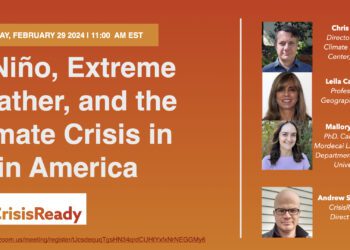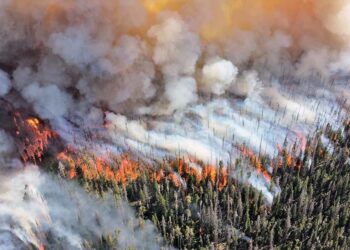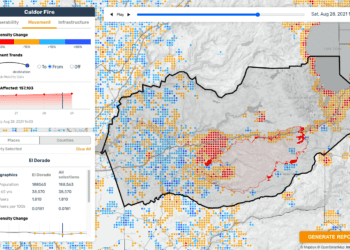Caroline Buckee, CrisisReady Co-Director and Professor of Epidemiology at Harvard T.H. Chan School of Public Health, is leading a research Cluster that will study the changing climate in South Asia, and the threat it poses to agricultural systems, food security, and human health in the region. Satchit Balsari, CrisisReady Co-Director and Assistant Professor of Emergency Medicine at Harvard Medical School, will be serving as the project’s co-investigator.
The Cluster is one of five supported by Harvard’s Salata Institute for Climate and Sustainability, which awarded grants to 30 faculty members across the university. With these grants, the research Clusters will tackle a range of climate change challenges to reduce future impacts and assist those who have already been affected by the crisis.
Climate change is a critical concern in South Asia — a region home to two billion people — as more extreme weather events are expected to increase in frequency and severity in the near future. The changing climate significantly increases the risk of droughts and rising sea levels, which threaten local agricultural systems as well as the food security and livelihoods of the hundreds of millions in the region. When interviewed about the research Cluster in the Harvard Gazette, Professor Buckee explained that South Asia is of interest to her because those in the Global South and in low-income settings are the most vulnerable to extreme weather events.
The region has seen increased incidents of flooding in the past year. Take for example the devastating floods that struck Pakistan in late-August 2022, which caused the displacement of millions of people and a death toll of at least 1,739. The floods increased the transmission of water-borne illnesses, namely cholera and malaria, which have exacerbated the public health impacts of the disaster. Professor Buckee explained that increased disease transmission is only one of many threats that happen when communities are flooded out. In an interview with Harvard Magazine, she described the research cluster as “fundamentally a translational project, where we’re trying to move beyond our own disciplines, to think about how communities deal with climate change.”
Echoing the need for climate research in the region, Professor Balsari stated that the impact of erratic weather events is not foremost in either the public consciousness or the consciousness of policymakers. He expanded on this, saying that “as you think about all that needs to be done, you begin to recognize the vastness of the scope of policy changes that one will need to influence in order to mitigate the impact of these extreme weather events on vulnerable populations.”
After a recent visit to India, Balsari understood that while extreme weather events may not be the greatest concern to officials in the region, they can be devastating to local farmers. He noted that current strategies like crop insurance can be inadequate, as policies tend to cover drought but not excessive or out-of-season rain, which could become more frequent as rainfall patterns shift.
Listening will be an important part of the project, Buckee said, as those with firsthand experience living in the region may have solutions that could be used as models elsewhere.
“In Bangladesh, where there have been cyclones and floods for decades, simple advances in storm shelters and evacuation patterns have significantly decreased mortality.”
“We should be leveraging these indigenous innovations across the global South.”
Professor Caroline Buckee
“Combining forces to accelerate climate action here, there, now,” The Harvard Gazette
Professors Buckee and Balsari will work in tandem with faculty from Harvard Business School, FAS, the Kennedy School, SEAS, and the Medical School, as well as UC Berkeley, the James P. Grant School of Public Health at BRAC University, and the All India Disaster Mitigation Institute.
The Cluster is also collaborating with in-region partners to ensure that local concerns inform a collaborative process of goal setting and developing a shared scientific vision. Partners include international agencies; nodal governmental agencies; leading policy research institutes; social entrepreneurs; BRAC, the world’s largest non-governmental organization; and the Self-Employed Women’s Association (SEWA), the world’s largest trade union of women workers in the informal sector. These partnerships ensure that adaptation planning is driven by the voices and concerns of the region’s vast labor force that primarily works in the informal economy as daily wage earners, farmhands, street vendors, constructions workers and more.
The Cluster will work closely with these partners to identify, co-create, test, and bring to scale climate adaptation strategies including technological, health, financial, policy and educational interventions that anticipate, mitigate or support migration when livelihoods and habitats are impacted by droughts, floods, and sea-level rise.
Such interventions may range from habitat modifications, to community-led surveillance for infectious diseases, to expanding insurance to include extreme weather events, to local, regional, and national plans for responding to climate change induced disruptions across timescales.
The Cluster’s research outputs will inform policymaking in the region and generate knowledge applicable in other geographic settings.



